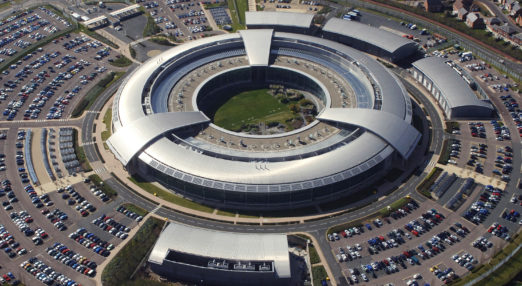Mass surveillance and Snoopers' Charter
People Vs Snoopers’ Charter: Liberty’s landmark challenge to mass surveillance powers heard in High Court
Posted on 17 Jun 2019
Our landmark challenge to mass surveillance powers heard in High Court
- World-first legal challenge to bulk hacking powers
- Judicial review this week is second part of Liberty’s challenge to Investigatory Powers Act – following 2018 victory
- “People vs Snoopers’ Charter” challenge funded by public donations
Our ground-breaking legal challenge to mass surveillance powers under the Snoopers’ Charter is being heard in the High Court this week.
The Snoopers’ Charter (the Investigatory Powers Act 2016) created the most intrusive and sweeping state surveillance regime of any democracy.
Through “bulk warrants”, the Snoopers’ Charter grants wide-ranging surveillance powers to State agencies who can scoop up and store the emails, text messages, calls, location data, and internet history of huge swathes of the population. These agencies can intercept everyone’s digital communications in bulk, hack into our computers, phones and tablets, and create vast “personal datasets” without suspicion.
The powers we are challenging allow for warrants for bulk interception, bulk hacking, bulk acquisition (compelling private companies to pass over people’s data), bulk retention and access (compelling private companies to retain people’s data and allowing access to it), and acquisition of bulk personal datasets (allowing agencies to retain, search and link vast databases on people held by the public or private sector).
Megan Goulding, lawyer at Liberty, said: “In creating the Snoopers’ Charter, the UK Government has attempted to legitimise the most sweeping and intrusive mass surveillance powers to be found anywhere in the democratic world. These powers allow the state to collect the messages, location and browsing history of innocent, ordinary people without grounds for suspicion.
“We are bringing this challenge because this law has no place in any credible democracy, least of all one with such a long and proud history of defending individual liberty. The Government must introduce a targeted surveillance regime that does not require its citizens to sacrifice their rights to privacy and freedom of expression.”
THE CASE
We will argue that various powers contained in the Act breach Article 8 (the right to privacy) and Article 10 (the right to freedom of expression) of the European Convention on Human Rights.
We will further argue that there are insufficient safeguards in the Act to protect confidential journalistic sources and legally privileged material. The National Union of Journalists is intervening regarding journalist protections.
MI5 ADMITS UNLAWFUL DATA RETENTION
Last week, as part of this litigation, it was revealed in court that MI5 has been unlawfully retaining people’s data obtained through the bulk powers we are challenging.
The full nature and extent of MI5’s illegal activity remains unknown as the Government is trying to keep it from the public, though the Investigatory Powers Commissioner said it was severe enough that he considers MI5’s handling of data to be in “special measures”. MI5’s startling admission that people’s data is being held in “ungoverned spaces” shows that the Act’s safeguards, and its oversight system, are inadequate for protecting our privacy and freedom of expression.
This inadequacy goes to the heart of Liberty’s challenge this week. Liberty’s case is that the Act’s safeguards are inadequate to protect people’s privacy and free expression, but MI5’s disclosures show they are failing to be enforced, so people’s rights are being violated even further.
BACKGROUND
This is the second part of our challenge to the Investigatory Powers Act. In April 2018, we won the first part of this case. The High Court found the Government’s power to order private companies to store communications data, including internet history, so that state agencies can access it, breached our rights to privacy.
The Investigatory Powers Act became law in late 2016. It was intended to introduce transparency to state surveillance following Edward Snowden’s revelations of unlawful mass monitoring of the public’s communications. Instead it legalised the practices he exposed – and introduced hugely intrusive new powers. It allows the state to hack computers, phones and tablets on an industrial scale, and collect the content of people’s digital communications and records about those communications created by our devices. It also allows the creation and linking of huge “bulk personal datasets”.
A public petition calling for its repeal attracted more than 200,000 signatures, but was not debated by Parliament.
In September 2018, Liberty, along with 13 other human rights and journalism groups and two individuals, won its challenge to the previous surveillance regime at the European Court of Human Rights. The Court found that the UK’s previous regime for bulk interception was unlawful.
The Investigatory Powers Act replaced and expanded the intrusive surveillance powers that the European Court of Human Rights found to breach our rights to privacy and free expression.
Liberty instructs Shamik Dutta at Bhatt Murphy Solicitors, Martin Chamberlain QC and David Heaton of Brick Court Chambers, and Ben Jaffey QC of Blackstone Chambers.
-



Court judgement allows the government to continue spying on us
We will challenge this judgment in the courts, and keep fighting for a targeted surveillance regime that respects our rights.
View this
-


Human rights group seek to build on historic surveillance judgement in Grand Chamber appeal
Human rights and privacy groups seek firmer ruling on bulk surveillance, appealing landmark judgment
View this
-



Legal challenge: Investigatory Powers Act
View this
I'm looking for advice on this
Did you know Liberty offers free human rights legal advice?
What are my rights on this?
Find out more about your rights and how the Human Rights Act protects them
Did you find this content useful?
Help us make our content even better by letting us know whether you found this page useful or not
